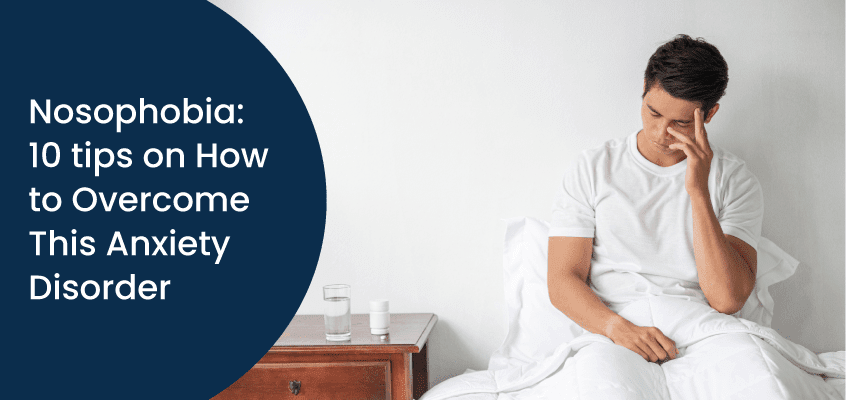Introduction
Nosophobia[1] is a mental condition or an anxiety disorder in which the affected person undergoes an unreasonable, persistent, and uncontrolled fear of acquiring chronic and sometimes life-threatening ailments like AIDS, STDs, cancer, and heart conditions. Nosophobia is often referred to as medical students’ disease because after learning about a particular health condition, they may start to believe that they have it.
This blog will take you through the symptoms, causes, effects, and treatment of nosophobia. Read on to learn more.
What is Nosophobia?
Nosophobia[3] comes from two Greek words – Nosos (disease) and Phobos (fear). It means an overwhelming illogical, unexplained, and consistent fear of contracting a severe medical condition. Nosophobia is also known as fear of getting sick, disease phobia, pathophobia, etc.
In recent years, nosophobia has also been called cyberchondria. It refers to people learning about a specific health condition in cyberspace (online) and then thinking they have it or will contract the same.
While it is obvious to feel anxious when a particular disease spreads across your community, nosophobia is persistent and affects daily life.
Nosophobia is often confused with an illness anxiety disorder (IAD or hypochondria). Although these ailments cause extreme anxiety around contracting diseases without any factuality, differences exist.
If you happen to get sick, it is essential to remember that many effective treatments are available for most illnesses. And most people live healthy lives with proper treatment.
Symptoms of Nosophobia
There are many symptoms of nosophobia[2] or the fear of getting sick. Some people may experience anxiety or panic when they think about getting sick, and they may avoid activities that could make them sick, such as going to public places or touching doorknobs. People with nosophobia may also obsessively wash their hands and avoid sick people.
The symptoms of nosophobia may vary from person to person. Some people may feel anxious about getting sick, while others may experience full-blown panic attacks. The most common symptoms include:
-
Feeling anxious or stressed about becoming ill
-
Worrying about contracting a specific disease
-
Constantly looking up information on diseases
-
Avoiding contact with people who are sick
-
Obsessively washing hands or sanitizing the environment
-
Constant self-checks for signs of illness
-
Dizziness and nausea
-
Trouble falling asleep
If you are experiencing any of these symptoms, seek professional help immediately. Doctors can treat nosophobia with therapy and medication, and you can learn how to manage your fears and live a healthy life with treatment.
Causes of Nosophobia
There are many causes of nosophobia[2] or the fear of getting sick – biological to environmental. Let us have a look at the factors that lead to the development of this condition:
Biological factors
-
Genetic changes or mutations causing fear of diseases
Psychological factors
-
Having any serious illness as a child may trigger the fear of diseases
-
Losing a loved one to a health condition
-
Being a caregiver for a family member with a life-threatening ailment
Environmental factors
-
Growing up among people with various illnesses
-
Growing up with a sibling or parent with an illness anxiety disorder (IAD), or any other phobia
Effects of Nosophobia
Nosophobia is a genuine and debilitating anxiety disorder. People with nosophobia often live in constant fear of becoming ill. They may avoid places with sick people, such as hospitals or clinics, and go to great lengths to sanitize their homes and workplaces. The condition may result in social isolation and a decreased quality of life.
There are several effects of nosophobia on a person’s life:
-
It may lead individuals to miss significant events like weddings and funerals.
-
It can lead to financial problems as the person may take time off work or avoid going out due to fear of getting sick.
-
It can cause relationship problems as the person may become withdrawn and unwilling to socialize.
Do you believe you have nosophobia? You can overcome your fear in various ways.
Firstly, you should seek professional help from a therapist or counsellor who can help you understand and manage your anxiety.
Secondly, you should expose yourself to situations that make you anxious and work on gradually overcoming this anxiety.
Finally, it would help if you stay relaxed and care for yourself. It consists of consuming a healthy diet, regular exercising, and getting enough sleep.
Treatment of Nosophobia
There are various treatment options available for individuals with nosophobia.
-
Cognitive-behavioural therapy: Also known as CBT, this treatment approach involves talk therapy. It helps identify and change the negative thought patterns contributing to the fear of getting sick.
-
Exposure therapy: During this therapy, your therapist will teach you various relaxation techniques while slowly exposing or letting you explore new information about health conditions and outbreaks.
-
Hypnotherapy: This procedure involves guided relaxation strategies to help you alter your thinking patterns and viewpoints regarding your health condition and risks.
-
Medications: Medications like anti-anxiety medications and antidepressants can also help treat nosophobia and make lifestyle changes.
Conclusion
Know that you are not alone if you have nosophobia or another phobia. This anxiety disorder is common, and it is possible to alleviate the symptoms and live an everyday life provided you have the right mindset and get the proper treatment.
The first step is understanding that the fear of getting sick is irrational and the chances of getting a disease are meagre. Secondly, educating yourself about illnesses and how they are transmitted is essential, and it will help dispel any myths triggering your nosophobia. Thirdly, it is necessary to face the fear head-on by gradually exposing yourself to situations that trigger anxiety.
Finally, it is essential to seek professional medical help if the fear is too much to handle. Visit United We care, a leading online mental health platform that connects you with expert psychologists who can help you overcome your fears.
Reference links:





